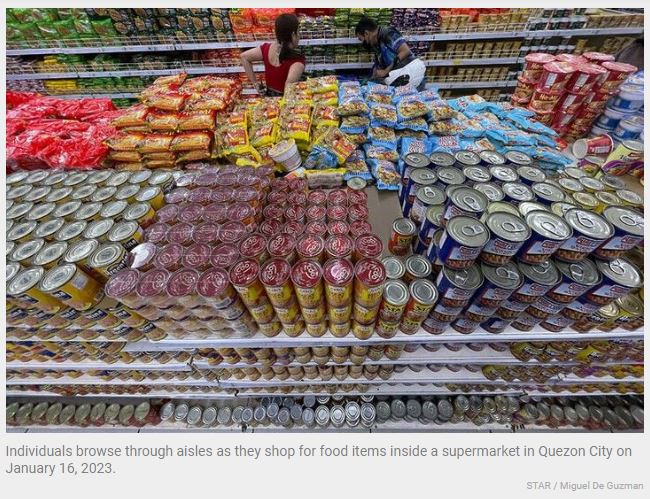Philippines: Inflation seen easing below 8% in January
MANILA, Philippines — Inflation likely eased below eight percent in January after accelerating for four consecutive months to hit a 14-year high of 8.1 percent, according to bank economists.
ING Bank senior economist Nicholas Mapa said Philippine inflation might have dipped to 7.8 percent in January, but is expected to remain at elevated levels as supply shortages persist.
“Low domestic production resulted in surging prices for basic food commodities. Meanwhile, still elevated global energy prices have resulted in high utility costs and rising gasoline prices,” he said.
Inflation accelerated to 5.8 percent last year, well above the two to four percent target set by the Bangko Sentral ng Pilipinas (BSP), from 3.9 percent in 2021 due to higher global oil prices amid Russia’s invasion of Ukraine, as well as elevated food prices due to supply shocks coming from China’s strict zero-COVID policy.
This prompted the BSP to raise interest rates by 350 basis points, which brought the benchmark rate to a 14-year high of 5.50 percent from an all-time low of two percent.
Security Bank chief economist Robert Dan Roces said inflation last month ranged between 7.4 and eight percent and likely settled at 7.7 percent, with food and utilities as the main contributors.
“Inflation is expected to begin tempering by the second quarter of 2023 mostly on base effects, a post-holiday consumption slowdown and a stable peso,” Roces said.
UnionBank chief economist Carlo Asuncion said inflation clocked in at 7.7 percent in January this year.
“Aside from softer oil and commodity prices alongside offshore recession risk, the high base effects will start to kick in by the second half of 2023 to assure inflation’s homecoming back to within the BSP’s target range as we end 2023. Low base effects will compel core inflation to remain elevated in the seven to eight percent year-on-year range in the first half of 2023 before succumbing to easing pressures in the second half to end the year at 4.2 percent,” Asuncion said.
The Aboitiz-led bank sees inflation easing slightly to 5.7 percent this year from last year’s 5.8 percent.
China Bank chief economist Domini Velasquez said inflation could remain elevated at 7.6 percent in January due to additional emerging price pressures such as the approved water tariffs of Manila Water and Maynilad in addition to higher electricity rates and another consecutive round of fuel price increases.
“We observed some slowdown in food prices this January and anticipate lower prices of other non-food items, such as restaurants, clothing, rent, etc., as demand likely fell after Christmas. In February, risks remain tilted on the upside given possible increase of LRT/MRT fare,” Velasquez said.
Globally, Velasquez said China’s reopening and higher than previously anticipated global growth would likely keep commodity prices somewhat lifted.
China Bank sees inflation easing to 5.3 percent this year after quickening to 5.8 percent last year, exceeding the BSP’s two to four percent target range, from 3.9 percent in 2021.
“Recent initiatives of the government to temper the increases in food prices should provide some relief. But the government should also be cognizant and proactive in addressing additional price pressures, e.g. increasing egg prices due to avian fly and calls for higher wage and transport fare hikes,” Velasquez said.
Alvin Arogo, economist at Lucio Tan’s Philippine National Bank, said inflation likely slowed down sharply to 7.3 percent in January and is expected to remain above four percent for the most part of the year but would fall within the central bank’s two to four percent target range in the fourth quarter.
Michael Ricafort, chief economist at Yuchengco-led Rizal Commercial Banking Corp., said inflation eased to a four month low of 7.2 percent in January, the lowest since the 6.9 percent recorded in September last year.
Inflation has been rising steadily after easing to 6.3 percent in August from 6.4 percent in July last year.
Meanwhile, the BSP may deliver more but slower rate hikes to help bring inflation back to within the central bank’s target range, according to economists.
Roces expects the central bank to downshift its hike pace to 25 basis points at each of its next two meetings to bring the reverse repurchase rate (RRP) to six percent, followed by a pause, due to the strong gross domestic product (GDP) growth of 7.6 percent last year and 5.7 percent in 2021..
“With policy differentials mattering less now given that the peso is behaved, and inflation on a likely downward trajectory, the BSP might probably opt not to follow the US Federal Reserve if it hikes by 25 basis points beyond five percent as signaled by Fed chair Jerome Powell, should the latter’s forward guidance mean a long pause as well,” Roces said.
According to Roces, headwinds include another round of wage increases and volatility in global commodity prices.
Ricafort also expects a possible end in the tightening cycle with local policy rate peaking at six percent with two 25-basis point hikes, each in February and March.
PNB’s Arogo, on the other hand, sees three more 75-basis-point hikes in February, March and May to bring the RRP to 6.25 percent.
Source: https://www.philstar.com/business/2023/02/06/2242783/inflation-seen-easing-below-8-january


 English
English




